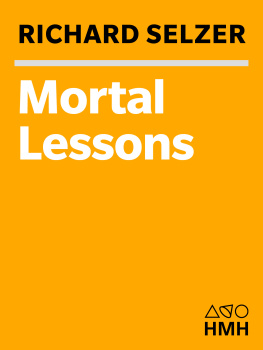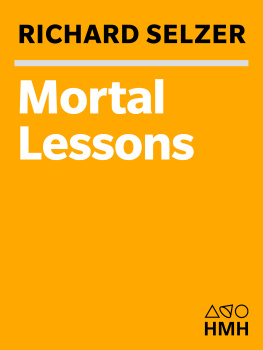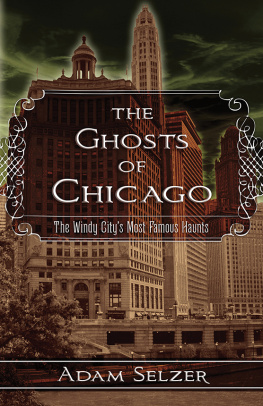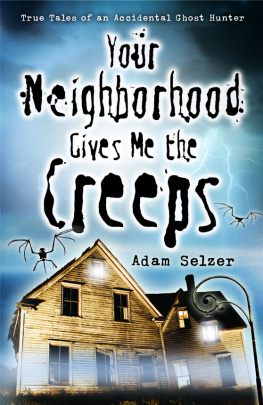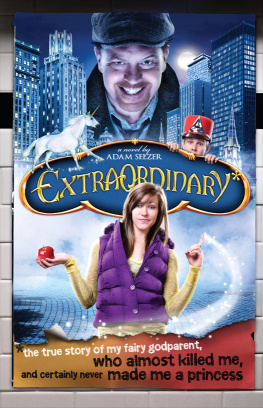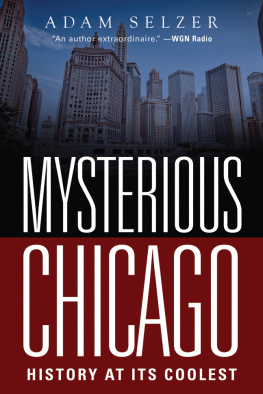Richard Selzer - Mortal Lessons
Here you can read online Richard Selzer - Mortal Lessons full text of the book (entire story) in english for free. Download pdf and epub, get meaning, cover and reviews about this ebook. publisher: Mariner Books, genre: Detective and thriller. Description of the work, (preface) as well as reviews are available. Best literature library LitArk.com created for fans of good reading and offers a wide selection of genres:
Romance novel
Science fiction
Adventure
Detective
Science
History
Home and family
Prose
Art
Politics
Computer
Non-fiction
Religion
Business
Children
Humor
Choose a favorite category and find really read worthwhile books. Enjoy immersion in the world of imagination, feel the emotions of the characters or learn something new for yourself, make an fascinating discovery.
- Book:Mortal Lessons
- Author:
- Publisher:Mariner Books
- Genre:
- Rating:4 / 5
- Favourites:Add to favourites
- Your mark:
- 80
- 1
- 2
- 3
- 4
- 5
Mortal Lessons: summary, description and annotation
We offer to read an annotation, description, summary or preface (depends on what the author of the book "Mortal Lessons" wrote himself). If you haven't found the necessary information about the book — write in the comments, we will try to find it.
Mortal Lessons — read online for free the complete book (whole text) full work
Below is the text of the book, divided by pages. System saving the place of the last page read, allows you to conveniently read the book "Mortal Lessons" online for free, without having to search again every time where you left off. Put a bookmark, and you can go to the page where you finished reading at any time.
Font size:
Interval:
Bookmark:
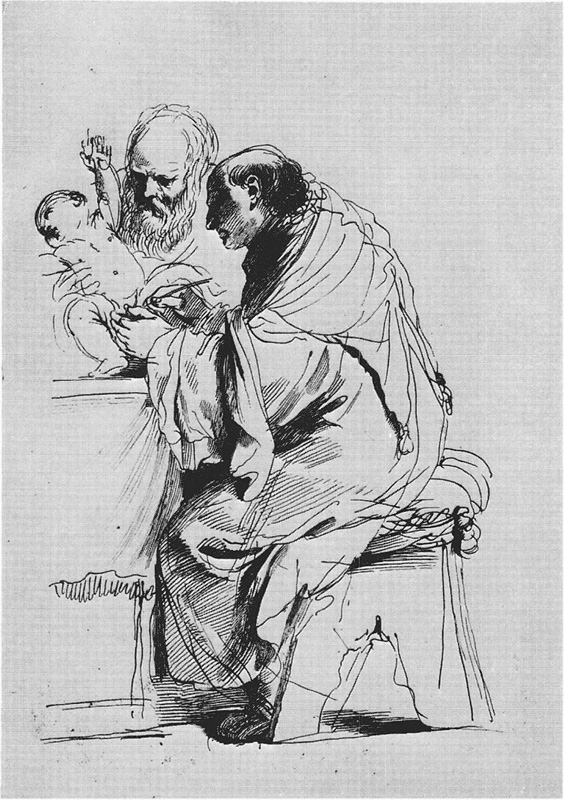
To Jon, Larry, and Gretchen
Preface copyright 1996 by Richard Selzer
Copyright 1974, 1975, 1976, 1987 by Richard Selzer
All rights reserved. No part of this publication may be reproduced or transmitted in any form or by any means, electronic or mechanical, including photocopy, recording, or any information storage system, without permission in writing from the publisher.
For information about permission to reproduce selections from this book, write to or to Permissions, Houghton Mifflin Harcourt Publishing Company, 3 Park Avenue, 19th Floor, New York, New York 10016.
www.hmhco.com
The Library of Congress has cataloged the print edition as follows:
Selzer, Richard, 1928
Mortal lessons: notes on the art of surgery/Richard Selzer
1st Harvest ed.
p. cm.(A Harvest book)
With a new preface.
Originally published: New York: Simon & Schuster, c1976.
ISBN 0-15-600400-3
1. Surgery. I. Title.
RD39.S44 1996
617dc20 95-53778
eISBN 978-0-547-54233-1
v2.1117
It is a quarter of a century since this book was written. Looking at it now, I am inclined to use an editorial pencil to spare myself a number of embarrassments this time around. Why do I have the feeling that these pieces were first written in a foreign language and that this volume is a translation for which I alone am responsible? Still, I am surprised that the author (perhaps it is best to consider that he and I are not the same person) has come so close to expressing precisely what I think now. In a way, that writer of twenty-five years ago is the older of the two, as I dont seem to think of myself as anything but a mere pickle of a boy. (Even in my dreams I am a youngster making love for the first time. It is both ridiculous and exhausting!)
There is no one way to write. The minimalists have shown that plain, unadorned prose in words of one syllable can reach the heights of beauty and power. Myself, I have always been intoxicated by words, grabbed up great armsful of them and run across the page letting fall what may, and only then pausing to select, sort, rearrange. I deplore that so many thousands of our best words have fallen into obsolescence or are deemed archaic. In this volume I have rescued not a few of those long-unused words and disinterred a number of buried phrases. If I could find no word to express what I intended, I made one up. Many is the reader who, having made a futile search in the dictionary, has written to condemn me for this outrage, an accusation that I have borne manfully over the years. It all has to do with surgery. In the act of surgery, the scalpel must be restrained rather than given its head. Holding back is the primary mode of surgery. After so many years of reining in his instrument, a surgeon-turned-writer must be forgiven for the exhilaration of the newly liberated. It is true that pen and scalpel are about the same size, and that in using each of them something is shedblood or ink. But there the similarities end. In writing the risk is all the authors; in surgery it belongs to the human being lying on the operating table. If I have followed any banner, it is that of Paul Valry, who wrote that prose walks, poetry dances. I have tried to blur the demarcation between the two. I cannot say that I have often succeeded.
Apropos of two essays in light of the passage of a quarter century: The chapter entitled The Corpse was not meant to shock but rather to invite the reader into the mausoleum of the newly dead and hold up the lamp of language. The facts are given but in language that heightens their effect; I have used humor and the grotesque as instruments of illumination. At the time of writing, the subject of abortion had just become a focus of contention in American society. Oddly, it happened that I had never seen an abortion. I arranged to do so and that night wrote what I had meant to be a literary rendition of the event, not an argument against the procedure. The readership thought otherwise, and upon publication I became the darling of the conservatives and the bte noire of the liberals. A pox on both houses! I am struck by the madness of a society that performs abortions in one operating room and harvests eggs for in vitro fertilization in the next. It would be sensible and efficient to carry the products of conception (as they are called by the unimaginative) from the glutted womb of the one to the starved womb of the other. But that is the mischievous fancy of a mere scribbler.
In writing the essay Bald! I had meant only to entertain. Now, twenty-five years later, the shaved male head is a la mode; one sees so many perfectly bald men on the street these days. It seems a gesture of defiance and so rather touching. Many is the partially bald man who, unwilling to suffer the slow and steady loss of his glory, has wrested the depilator from the hand of Fate and taken it into his own, the way a martyr seizes the everlasting kingdom of heaven. Such a man is no longer going bald; he has gone. About baldness, I feel differently. It has to do with chemotherapy. There is the recent account of a young schoolboy who was receiving chemotherapy for cancer. He had turned bald. What was his surprise, upon returning to school, to find that all of the boys in the fifth grade were also bald, as was their male teacher. To spare their friend any embarrassment or humiliation, they had all chosen to have their heads shaved. In this classroom, if nowhere else, bald was what everyone wanted to be. Such an act of communal grace gives reason to hope for the future of mankind.
Against all advice, I continue to write in longhand. To say nothing of the genie who dwells in my inkwell and who grants me three wishes each time I remove the lid to fill my fountain pen, longhand provides a lovely proximity to the word. You can watch it issuing from the tips of your fingers as though it were a secretion of your body. The word processor that can offer such a sense of personal discharge does not exist. Then too, there is the position of the hand when holding a pen. The thumb and forefinger approximate a sling whose base is the first web space. Begin to write and there is a pressure of the instrument against the more rigidly fixed middle finger precisely at its distal interphalangeal joint. The whole enterprise is given voice by the flat of the hand, the hypothenar eminence to the cognoscenti, as it slides with quick small hisses across the page until that long hiss as the hand moves all the way from right to left in order to start a new line. How can anyone write without it?
It is nine years since I walked away from my beloved workshop in the operating room. It was a departure not done with a cheery wave of the hand. The operating room was my native land. A writer leaves his native land only at great risk. There was a feeling of dislocation, as though I were standing on the bank of a river, and it was the bank that was flowing while the stream stood still. Would I be punished? Suffer impotence of the pen? After all, my subject as a writer was my work as a doctor; the two cross-fertilized each other. I need not have worried. There is always the sharp and aching tooth of memory. And my dreams are still filled with surgery.
Someone asked me why a surgeon would write. Why, when the shelves are already too full? They sag under the deadweight of books. To add a single adverb is to risk exceeding the strength of the boards. A surgeon should abstain. A surgeon, whose fingers are more at home in the steamy gullies of the body than they are tapping the dry keys of a typewriter. A surgeon, who feels the slow slide of intestines against the back of his hand and is no more alarmed than were a family of snakes taking their comfort from such an indolent rubbing. A surgeon, who palms the human heart as though it were some captured bird.
Font size:
Interval:
Bookmark:
Similar books «Mortal Lessons»
Look at similar books to Mortal Lessons. We have selected literature similar in name and meaning in the hope of providing readers with more options to find new, interesting, not yet read works.
Discussion, reviews of the book Mortal Lessons and just readers' own opinions. Leave your comments, write what you think about the work, its meaning or the main characters. Specify what exactly you liked and what you didn't like, and why you think so.

